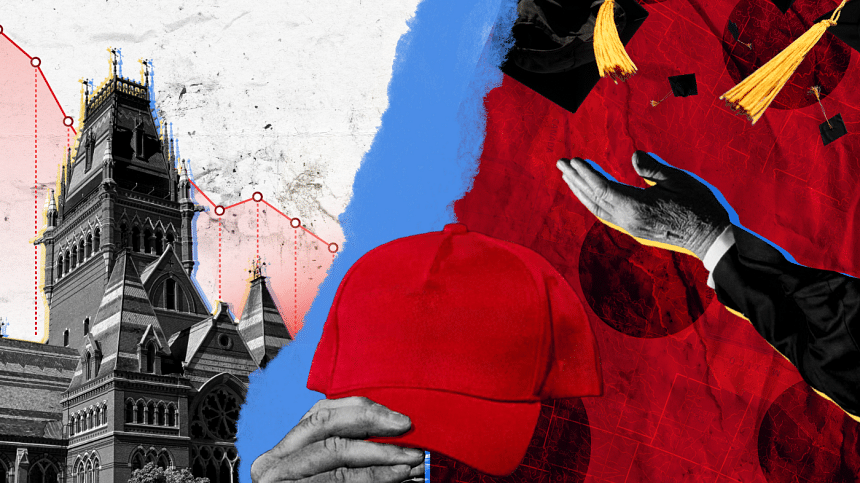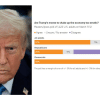How the US funding cuts are affecting international graduate students

Academia in the US has been severely shaken after the second term of the Trump administration began in January. From federal funding cuts to demands for policy changes, many universities have been hit hard, with international students feeling the brunt of the effects.
Many US federal agencies have had their funds slashed or have been ordered to be slashed or frozen, including the National Institute of Health (NIH) which funds portions of medical research in many research institutions nationwide. This has, in turn, led to research grants being cut or threatened to be cut for many universities in the US, causing major layoffs and jeopardising research in the medical field, climate sciences, and social sciences. The Trump administration has been actively leveraging the NIH funding to force US universities to change their policies regarding Diversity, Equity, and Inclusion (DEI) and pro-Palestine sentiments on campus.
As a result, universities are having to shrink department sizes, reduce student intake, slash funding for students, and even rescind offer letters. This has created immense uncertainty for current and prospective international students, who already face more barriers than domestic students, and may have far-reaching consequences for the future of academia.
"Despite their prestige, US schools feel increasingly inaccessible. It's hard to commit to a programme when financial uncertainty constantly looms over the experience," says Anika Tabassum Amreen, a US graduate school applicant. Higher education in the US is notorious for being incredibly expensive, more so for international students, but this was alleviated by the generous scholarships given by US schools. However, now that those scholarships are far fewer in number due to funding cuts, they have become much less reliable. Students who had hoped for these scholarships to fund their higher education now face the unprecedented challenge of navigating other ways of securing funding.
While domestic students can still work and pay for their tuition, international students don't enjoy the same freedom. "As an international student, employment is restricted to on-campus jobs, making the search even more challenging," says Amreen. Furthermore, graduate assistantships and other on-campus opportunities can be highly competitive, making them inaccessible to most students.
So what other choice are international students left with? Not much. Financial burdens and visa uncertainties are leading many to reconsider the US as their study destination. "I am not going to be prioritising US programmes for the time being until there is more clarity regarding the situation surrounding higher education there," says Hamza Mohammed, a prospective PhD student, who had initially intended to study in the US but is now considering other regions as well, such as Europe.
Many students applying to US schools have also reported that their admissions or scholarships were rescinded. "Cornell is trying to make sure the current students have secured funding before taking in new students," says Nabila Nawar Binti, a graduate research assistant at Cornell University. More than one billion USD in funding for Cornell was frozen according to the White House. While it is only right that universities prioritise supporting their already existing students before they can fund incoming ones, this puts prospective students at a disadvantage as it makes admission and securing scholarships that much more difficult.
"Two of the universities where I had obtained funding informed me that they will no longer be able to provide the promised funding due to cuts to their research budgets," says Hamza. As the US is the premier study destination for students around the world, this will certainly put the academic aspirations of many international students in jeopardy.
The funding cuts are not only affecting prospective students in the US but also current ones. "A lot of the students who expected funding were still doing rotations when they found out about the cuts, so they had to find additional rotations while their funding was frozen," says Nabila. Rotations are short research experiences, usually spanning a few weeks, that graduate students cycle through in order to gain experience and find which research areas are best suited for them. Having to do more lab rotations, because the funding for their own research got frozen, spells delays for these students' own research work, which is a significant hurdle for students who want to complete their degrees in a timely manner.
Universities themselves have also been struggling to manage, with massive damage being done to research efforts. Todd Wolfson, president of the American Association of University Professors, told The Guardian, "Members of mine are having to lay people off and having to close their labs. It's been a complete, utter, destruction of the United States research infrastructure."

This not only affects students' education but also on-campus employment opportunities for current students, as many international students rely on research assistant and teaching assistant positions to pay for their tuition. If laid off, they will be left without this support, and the financial burden may become unbearable.
The Trump administration's demand for scrapping DEI programmes that supported underrepresented and underprivileged groups can also have a significant impact on international students. An example of DEI programmes that support international students is the International Mentoring Program at Brown University which pairs incoming international students with mentors from within the student body to guide them in academic and social matters.
Another example is the Associated Students of the University of Washington (ASUW), a student association at the University of Washington which provides students identity-based support, access to legislative advocacy, and inclusive programming. If the DEI scrapping measures target programmes and organisations such as this, international students will be left at a disadvantage.
The administration also demanded that institutions change their admission processes "to prevent admitting international students hostile to the American values", without clearly specifying what is exactly meant by "American values". This is certain to harm many international students from around the world, whose academic careers could be harmed by such arbitrary notions. Additionally, the government's demands that universities must report students engaged in political protests and overhaul their campus protest policies in order to address "anti-semitism" will not only negatively impact many current students but also deter many international students from applying to American universities in the near future.
Columbia University has yielded to many of the administration's demands, in hopes of restoring funding worth USD 400 million. On the other hand, Harvard University has refused to budge despite threats of massive funding cuts, with its president Alan Garber asserting Harvard's commitment to autonomy as a private institution. Following Harvard's lead, a collective of other elite schools have joined forces to combat the demands made by the Trump administration, with their leaders reportedly having discussions on how to effectively resist said demands. Other prominent universities, such as Stanford University, University of Pennsylvania, and University of Michigan, have also been targeted by the administration.
At this point, it is a lose-lose situation for international students, because if the universities yield to the demands, it will make higher education a lot more tumultuous for them as the DEI measures will have to be scrapped, they will be scrutinised more heavily during the admission process, and there will be a looming threat of losing funding should the universities accept more of the Trump administration's whims in the future. However, if the universities decide to resist instead, they will probably have much less money at their disposal, thus many international students will be left without funding or even admission offers.
International students make invaluable contributions towards research in the US. Thus, considering the difficulties they face now and are likely to continue facing under the current administration, the future of American graduate education looks grim. With a smaller pool of researchers, a shrunken budget, and the general volatility of the political climate, a perfect storm beckons over the horizon.
"Not only budget cuts, but visa revocation of many international students in recent times, along with some other probable policy changes will grossly impact the future of graduate education," says Dr Tanvir R Faisal, an assistant professor at the University of Louisiana at Lafayette.
On top of all this chaos, the visa application process is already mired with a great deal of uncertainty. Even if you get offered admission and somehow manage to secure sufficient funding, there is always the possibility that your visa will be rejected and your dreams of attending graduate school in the US will be shattered. This is nothing new, but it piles up with all the other obstacles that prospective international students are facing.
It is still difficult to tell exactly how detrimental the Trump administration's actions will be to academia, but there is no doubt that they will be severe. And yet, hope cannot be lost, and there are practical measures that can be taken to mitigate the onslaught of funding cuts.
According to Dr Faisal, "One possible option is (for universities) to negotiate with state legislators to increase state-level funding, increase industrial ties for funding, and discuss/raise the issues with congressmen/~women and senators of respective states/congressional districts to reinstate or increase the federal budget for higher education."
Needless to say, the recent measures taken by US President Trump have caught the world of academia off guard, especially international students. Arguably, they are feeling the worst of the effects, from slashed funding to fewer opportunities to even being targeted by authorities. Only time will tell how much longer these conditions will persist, and much will depend on how university authorities decide to tackle the administration's demands and what they do to counteract them.
Rafid is on a quest to romanticise the crushing mundanity of life. Annoy him at [email protected].

 For all latest news, follow The Daily Star's Google News channel.
For all latest news, follow The Daily Star's Google News channel. 










Comments